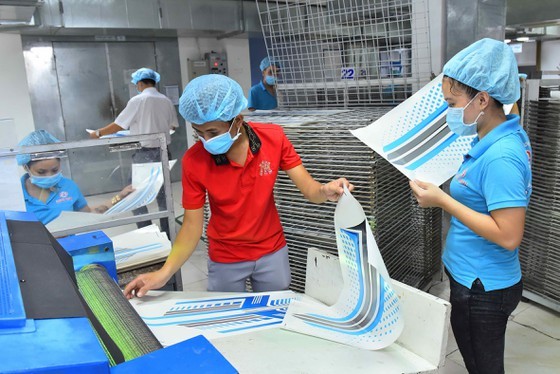
Bright spots
As soon as the Covid-19 pandemic broke out in early 2020, some domestic enterprises operating in the field of food and foodstuff production have changed rapidly. Accordingly, instead of being interrupted production due to the break of the source of imported raw materials, enterprises have transformed by cooperating or quickly investing in production lines of raw materials from domestic agricultural and fisheries resources.
Several enterprises, namely ABC Bakery, Acecook, Saigon Food, Cholimex, Vinamilk, San Ha, and Ba Huan, have proactively sought the source of alternative materials, along with researching and creating new products using raw materials that are the strength of domestic enterprises.
On the other hand, they have adjusted more convenient product lines. It not only helps enterprises to grow well but also contributes significantly to the general economic growth of the country.
Ms. Ly Kim Chi, Chairwoman of the Food and Foodstuff Association of Ho Chi Minh City, said that the agricultural sector contributed an important bright spot, affirming its pillar role in the economy during difficult times when its growth reached 2.68 percent, higher than the level of 2.01 percent in 2019. Exports continuously set new records when the total export turnover of agricultural, forestry, and fishery products in 2020 topped US$41.2 billion, up 2.5 percent compared to 2019, and the trade surplus of the agricultural industry hit $10.4 billion, an increase of 6.5 percent.
In the first two months of this year, the export turnover of agricultural, forestry, and fishery products is estimated at $2.78 billion, up 3 percent year-on-year. Of which, the group of main agricultural products is estimated at nearly $1.35 billion, up 19.8 percent year-on-year.
Another field that also shows a sprint of domestic enterprises is supporting industry manufacturing. The story that domestic enterprises are even unable to produce screws has no longer existed but instead, domestic enterprises have become the target of many leading enterprises.
Ms. Le Nguyen Duy Oanh, Deputy Director of HCMC Center of Supporting Industries Development, said that many enterprises, such as Minh Nguyen Supporting Industry Joint Stock Company, Minh Man Printing Company, Bach Tung Mechanics, and Lap Phuc, have been full of orders. Enterprises even have had to refuse many supply orders because of insufficient production capacity.
Enterprises need revitalization
In the opposite direction, in the first two months of this year, 33,600 enterprises suspended their operation for a definite period, stopped working, waiting for dissolution procedures, and completed dissolution procedures, up 18.6 percent compared to the same period last year. This shows that the internal resource of enterprises, especially domestic enterprises, remains weak amid the market shocks.
Domestic enterprises that maintained their advantages, as well as a huge level of profits last year are mainly in the field of food and foodstuff processing. As for the industrial sector in general, enterprises have just been able to fulfill orders for simple products. As for the core products, which require high technology and have various details, the response rate remains low. Currently, domestic enterprises are only tier 3 or tier 4 suppliers in the global supply chain of FDI enterprises.
There are two main reasons for the weak internal resources of domestic enterprises. Firstly, the supporting policy mechanisms for businesses remain unequal between foreign and domestic enterprises. Secondly, the capital supply market with preferential policies is still limited.
Mr. Tong Duy Khanh, CEO of Duy Khanh Mechanical Co., Ltd., said that the company invested in building a new factory to produce supporting industry products in the Saigon Hi-tech Park. However, for more than four years, the administrative procedures related to the investment authorization have not been completed. Meanwhile, for foreign enterprises, it only takes a few months to complete necessary administrative procedures.
According to Mr. Chu Tien Dung, Chairman of the HCMC Union of Business Association, it is difficult for small and medium-sized enterprises to approach preferential loans. For instance, from the beginning of last year to now, after waves of Covid-19, many enterprises have been forced to operate perfunctorily because orders were interrupted. The government has immediately launched many financial packages to support enterprises. However, up to 61 percent of enterprises said that access to support policies was not easy. About 28 percent of enterprises said that the procedures for support policies were still complicated while 14 percent said that the authorities did not give instructions enthusiastically.
Worse, in the context of the prolonged Covid-19 pandemic, domestic firms became exhausted, creating a gap in the market, and foreign investment capital flows have immediately appeared. Many foreign enterprises have shortened the time to penetrate the domestic market by acquiring some domestic enterprises that already have domestic and export market shares.
Information from the General Statistics Office of Vietnam shows that from the beginning of this year to now, foreign capital flows have still increased in Vietnam. Of which, there were 445 times of capital contribution and share purchase by foreign investors, with a total value of $543.1 million. Earlier, in 2020, there were 6,141 times of capital contribution and share purchase by foreign investors, with a total value of $7.5 billion.
Many experts said that FDI flows will continue to shift strongly to Vietnam in 2021. The problem is that domestic enterprises need to proactively change production methods and product types, along with strengthening production capacity. As for enterprises that have been in the global supply chain, they need to expand their production scale to meet the requirements of supplying bigger orders.
More importantly, for enterprises to do so, authorities need to speed up unfreezing the flow of support capital, investment land fund, quickly implement support policies on taxes, fees, and interest rates to enterprises, avoiding the current situation, in which although there are policies, but the lower levels leisurely wait for instructions.
























